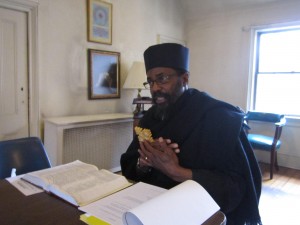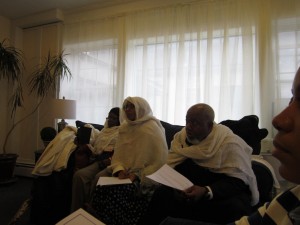Pastoral Care: Our Unity between Clergy and Laity
Englewood, NJ – “By our ministry,” the V. Rev. Fr. Melake Ganet Tesfa Eyesus declared to an enraptured audience, “the faithful are brought to Holy Baptism; by our prayers they are blessed; by the imposition of our hands they receive from God the Holy Spirit, and they enter the Kingdom of Grace…as much as possible, the priest ought to reach out to each member of his flock individually, to edify them in private, and by familiar exhortation, strive to produce fruit in the hearts of his people”.
With these words, the pastor of Debre Ganet Kidus Gabriel Ethiopian Orthodox Tewahedo Church in Orange, NJ, eloquently summarized the theme of Pastoral Care: Our Unity Between Clergy and Laity, a spiritual retreat convened during the recent Great and Holy Fast designed to minister to the specific needs of Western born, primarily English-speaking Orthodox Christians. Attendees of the conference were largely drawn from the faithful of four area Ethiopian Orthodox churches:
- Debre Ganet Kidus Gabriel in Orange, NJ
- St. Michael in Englewood, NJ
- Kidus Selassie in Bronx, NY
- Medhane Alem in Bronx, NY
Thirsty for an authentically Orthodox model of mission and ministry to Orthodox Christians raised in the West, however, members of local Coptic and Malankara-Syriac churches also attended the one-day retreat, convened on Saturday, March 28, 2015 from 9:00 AM – 5:00 PM under the auspices of H.E. Abune Zekarias of the Ethiopian Orthodox Archdiocese of New York, where they too benefited greatly from the hands-on pastoral care lovingly meted out like so much manna by the Ethiopian fathers.
Rightly identifying a specific need for English-language ministry to Western Born Orthodox Christians – whether they are second-generation immigrants from traditionally Orthodox nations or converts from the population at large – delivered according to an Orthodox model and in accordance with an Orthodox ethos and phronema, each of the fathers tackled a specific aspect of the topic of pastoral care in a number of rotating breakout sessions:
- V. Rev. Fr. Melake Ganet Tesfa Eyesus’ talk was concerned with the spiritual life of the Church from the understanding of pastoral care delivered within the context of the Holy Mysteries.
- V. Rev. Fr. Melake Hayel Amde Tsion-Durden discussed the ways in which the Church should affect the daily lives of the faithful, enriching them and the world around them through an integrally Orthodox model of pastoral theology.
- V. Rev. Fr. Melake Tsion Mahitma Selassie instructed his audience on how pastoral care should factor into their decisions as Orthodox Christians regarding pathology and illness, and how they might maintain their mental, spiritual, and physical health in a way that is consistent with the teachings and morality of the Church.
- V. Rev. Fr. Melake Selam Paulos spoke on the necessity of almsgiving and caring for the least among us as a means of expressing our genuine love for God and His Church, and enriching our own lives through the blessing of giving to others.
- Rev. Fr. Saife Selassie outlined how our faith, doctrine, and practice is governed by sound theology and explored the theological principles behind pastoral care and how this affects the day-to-day faith and practice of the Orthodox Church
- Special guest speaker V. Rev. Fr. Abraham Wassef of St. Mina Coptic Orthodox Church in Holmdel, NJ delivered a solidly Orthodox, profoundly spiritual, and powerfully moving keynote sermon on the conference’s general theme.
The Ethiopian Orthodox fathers organized their conference along lines which should be emulated by any Orthodox clergyman or lay servant interested in ministry and mission in the West, eschewing both exclusive ethnocentrism and the adoption of Evangelical Protestant missionary models in favor of a wholly Orthodox approach. More than 50 years ago, Fr. Alexander Schmemann of Thrice-Blessed Memory observed in his article Problems of Orthodoxy in America: II. The Liturgical Problem, that in the main there are two camps in the Orthodox Church:
- Those who have little or no interest in mission and evangelism and wish to recreate the Church in the West in the image of what they remember from their homeland, even as it pertains to the maintenance of the language of their homeland as the primary language of the Liturgy and instruction. This group often conflates the maintenance of cultural practices with upholding Orthodoxy.
- Those who think the cultural integration of Orthodoxy into the West means acquiescence to and the adoption of heterodox ethos and praxis. This group often sees the differences between Orthodoxy and the various heterodox confessions as being “cultural” and fails to recognize that cultural integration and the adoption of heteropraxis are not the same thing. Those in this category who acknowledge that there are theological differences between the Orthodox Church and Western confessions tend to minimize those differences and/or fail to recognize the dangers to the souls of the faithful inherent in the adoption of heteropraxis and the utilization of heterodox materials within the life of the Orthodox Church.
The same is largely true today, but there is a third camp; small, but dedicated and growing: those on the narrow path who seek the genuine integration of Orthodoxy into the culture of the land in which they live without compromise in Orthodoxy or orthopraxis. While this group is not generally interested in using the Church as a vehicle for the maintenance of any particular culture, they recognize the fact that the Orthodox Church regards itself as being the Church in the most exclusive sense of the term possible and that the adoption of heteropraxis means the de facto adoption of the heterodoxy which informs it and of which it is a natural outgrowth. Glory be to God, the fathers of the Ethiopian Church who convened this conference fall decidedly into the third camp.
As H.H. Mor Ignatius Aphrem II remarked at a recent meeting of the Standing Conference of Oriental Orthodox Churches, the Ethiopian Orthodox mission in North America and the West Indies stands as a model to be emulated by all Orthodox churches. May God give the fathers of this venerable church to – as Fr. Tesfa Eyesus declared – “produce fruit in the hearts of His people”, and may their authentically Orthodox model of mission and ministry spread throughout the West.
The fathers of the New York area Ethiopian churches plan to make their Lenten retreat an annual occurrence. Watch the SCOOCH website for more information if you’re interested in taking the blessing of attending.


